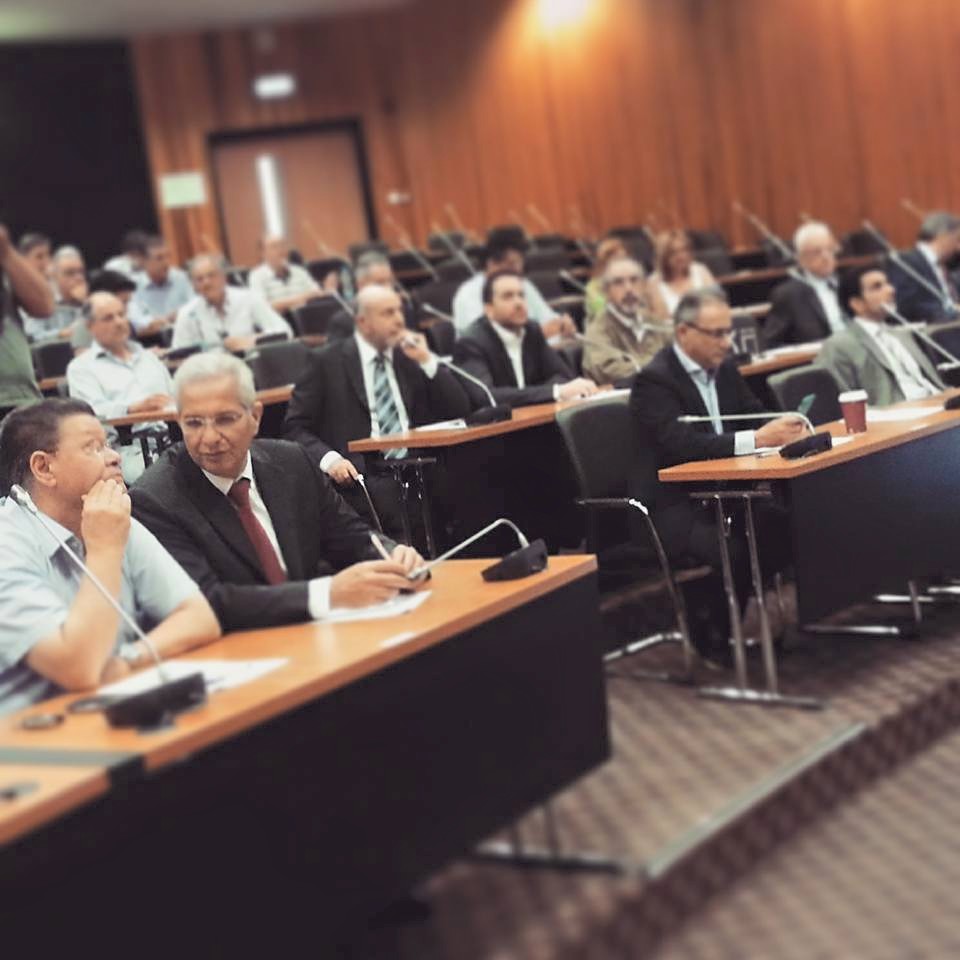
Speech of Andros Kyprianou, General Secretary of the C.C. of AKEL, at the conference “Cyprus-Greece: the path towards growth and development”
Saturday 16th May 2015, International Conference Hall, Nicosia
 I want to start by thanking the Vice-President of the Greek Government, Mr. Yiannis Dragasakis for his participation in today’s conference, as well as the Cypriot Finance Minister Haris Georgiades. I thank them for accepting our invitation. We considered useful the organization of such a discussion that would provide an opportunity to hear different opinions and concerns about the policies followed in the EU and at a national level.
I want to start by thanking the Vice-President of the Greek Government, Mr. Yiannis Dragasakis for his participation in today’s conference, as well as the Cypriot Finance Minister Haris Georgiades. I thank them for accepting our invitation. We considered useful the organization of such a discussion that would provide an opportunity to hear different opinions and concerns about the policies followed in the EU and at a national level.
I would like from the beginning to note that the struggle waged by the Greek Government for the Greek people’s right to decide its future to be respected does not just concern Greece, it concerns all the peoples in the Europen Union. Greece’s success to convince of its right to decide on various issues will be a springboard for other countries as well, among them Cyprus too, to assert an end to austerity policies and a change of economic philosophy at a European level. I want to wish every success to the Greek Government’s efforts and I hope that Cyprus will stand in support of this effort.
Today’s forum is part of the events in honor of the 22nd Congress of AKEL on the Cyprus economy and the path to growth and development.
Indeed such a debate could take place in any country of the southern Europe under the same title because what we have been experiencing in Cyprus over the past two years is what Greece since 2009, Ireland and Portugal before and Spain later on have all been experiencing, that is to say a standard recipe for all Eurozone countries which although faced with different problems with different structures in the economy, nonetheless, a common recipe was imposed on them, namely austerity, privatizations, wage cuts, the deregulation of the labour market and the selling off of public wealth.
The deepening of neoliberalism in the European Union as a response to the economic crisis plunged Europe into poverty and unemployment. According to Eurostat, between the years 2008-2014 more than 300,000 construction companies in the European Union have closed down. Of these 200,000 are very small companies. Unemployment in the European Union has risen to 24.5 million. 122 million Europeans live in poverty. At the same time, the profit rates of banks and related entities were maintained at 38%, almost the same as before the outbreak of the crisis.
Is this the future of the European peoples?
The crisis will run its course, like all the systemic crises, as is the case with the rest of the countries under a Memorandum. The question is: what impact will the crisis leave behind? How much social cost will it have caused? How much poverty and misery will it have led too? How much impoverishment and decay will it leave? Apart from this, we are concerned about the day after the crisis, that is to say that Cyprus itself will not belong to us.
The Government is constantly expressing its satisfaction with the course of the Cyprus economy. At the same time however Cyprus is recording the highest percentage figures in recession, both in 2013 and 2014. At the same time the European Commission, one of the three members of the Troika, is revising its forecast for 2015 downwards, foreseeing recession instead of growth – contrary to what it had originally predicted.
The government states that it has managed to reduce the unemployment rate after a period of continuous increase in its rate. However, it conceals the fact that Cyprus has the fifth highest unemployment rate in the European Union. Of course this does not include the number of those who have stopped being registered in the list of the unemployed because they do not expect to find work. Furthermore, the fact that since 2013 migration from Cyprus to abroad has after decades risen is also being concealed. Our country’s new generation no longer remains in Cyprus to work.
The Government also states that Cyprus has returned to the markets and has achieved historically low bond yields. It does not however mention that in Cyprus we have the highest housing mortgages and business interest rates in the Eurozone; interest rates do not enable the promotion of new projects.
The Government notes that it has a pillow of 2 billion Euros as a result of the program. It does not however stop demanding the immediate selling off of public wealth.
These contradictions are hurting society more and more deeply.
We do overlook the fact that steps have been taken in the Cyprus economy. Besides, like any economy it has a dynamic character. The economy evolves. The challenge however is for the economy’s evolution and development to benefit society. We regret to point out that the actions taken so far have been in the interests of a few, namely the elite and the privileged. These actions and policies have helped to widen the gap between rich and poor. They have contributed to the deregulation of the labour market and the curbing of working people’s rights.
All the above should make us reflect and lead us to change the philosophy being pursued so far. Certainly first and foremost we need to recognize the existence of these phenomena; to acknowledge the need to tackle unemployment and poverty.
The government must recognize that an economy that is dogmatically implementing the policy of austerity and cuts has no future. Public wealth should be protected and a new growth and development strategy must be elaborated for the country; a strategy that will aim to improve the living standards of society and protect the most vulnerable groups of the population.
I shall therefore put the question again. Can the policy of vicious cuts and deregulation be the future for Cyprus, and for Europe too?
I am sure that today’s speakers will have a lot to present, each one from his own perspective. In conclusion, I would like to reiterate that AKEL will continue to act guided by the interests of Cyprus and the working people.




